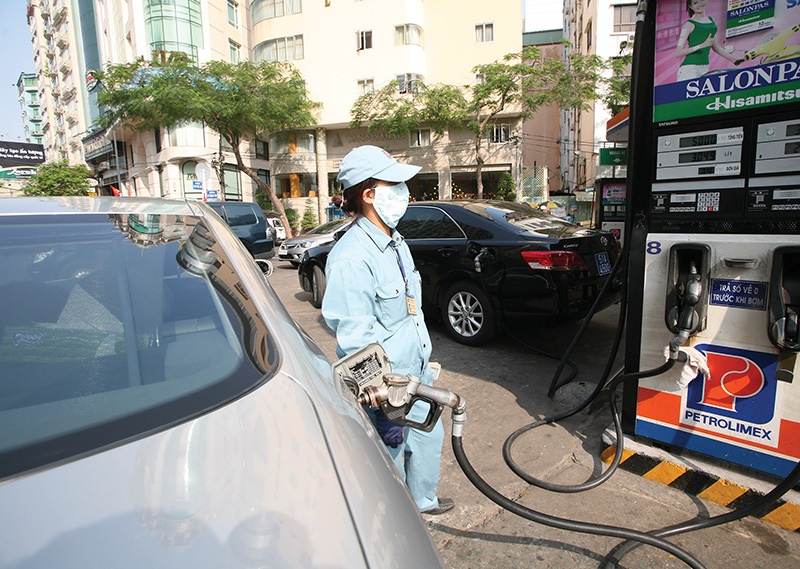Enterprises on edge with oil price hikes
 |
| Rises of gasoline prices can affect drivers and their typical incomes, photo Le Toan |
Last week, Tran Van Thanh, general director at A Chau Transportation JSC, was busy rebalancing input prices and offering reasonable freight rates for customers.
“The situation is getting tough but we can’t renegotiate contracts with partners. The latest hike in Asia was before Lunar New Year, and most customers accepted this as the reason for high gasoline prices,” he said.
Crude oil prices in the global market continue to increase after surpassing $90 per barrel at the beginning of February. On February 16, Brent crude oil increased by 1.6 per cent to $94.81 per barrel while the West Texas Intermediate per barrel rose to $93.66.
With the rising momentum, retail gasoline prices in Vietnam reached the highest level in eight years. Each litre of RON95 now costs more than VND25,000 ($1.10) per litre.
The transport sector has been hit hard by escalating gasoline prices. Bui Danh Lien, vice chairman of the Hanoi Transport Association, said, “The petrol costs for transportation increased by 15-20 per cent following the price hikes. Meanwhile, road passenger transport is only operating at about 30 per cent of capacity.”
The increase in gasoline prices has dragged down drivers’ incomes. “The petrol costs account for 40 per cent of the freight rate structure,” Lien said. “The high fuel price leaves two options for the transportation industry. Firstly, if the freight rates don’t rise, workers will have no income and then quit their jobs. Secondly, if the freight rates increase, it will greatly affect customers. As a result, the number of customers will decrease more sharply. Moreover, most customers are not willing to renegotiate contracts.”
Lien is unsure when the new freight rates would be implemented. However, if gasoline costs continue to rise, they will undoubtedly change business operations and service quality. Normally, it takes 15-20 days for transport businesses to raise freight prices after a price adjustment.
The rising gasoline price concurs with a steep spike in the raw input materials in the fourth quarter of 2021, which has led to greater volatility in business operations.
Nguyen Thuong Lang, lecturer at the National Economics University, said that Vietnam’s economy depends largely on imported input materials, which account for 37 per cent of the economy’s total input expenses. “High fuel costs have had a huge impact on industrial production, slowing down the recovery of the economy,” said Lang.
Data from the General Statistics Office showed that the index of industrial production was estimated to decrease by 3.1 per cent in January compared to the previous month. Among them, crude oil and natural gas exploitation decreased by 9.7 per cent.
Last week, the Ministry of Industry and Trade conducted an inspection of the main petroleum trading enterprises to check the data of inputs, of sales, and also inventories.
“This solution only solves the surface situation of hoarding goods. The market is in dire need of regulations by the state. The state needs to take drastic action to control rising petrol prices, exploit the petroleum stabilisation fund as efficiently as possible, and combat gasoline speculation before the next price adjustment period,” Lang said.
Fuel inflation has continued to rise, with January’s data showing a 1.9 per cent increase over the same period in 2021.
On February 11, HSBC raised its projection for Vietnam’s average inflation from 2.7 to 3 per cent in 2022 but confirmed it is a “negligible risk”. However, it should not pose a major risk to the State Bank of Vietnam, as it will likely remain well below the 4 per cent inflation target.
According to HSBC, Vietnam saw a rosy start in 2022 thanks to recovering domestic consumption and strong external metrics. Most importantly, Vietnam’s key growth engine is set to see a strong recovery, as the labour shortages continue to ease.
| Prime Minister Pham Minh Chinh last week sent a notice to relevant ministries on ensuring the supply of petroleum for the domestic market. The PM requested to ensure inflation control, macroeconomic stability, and support for economic recovery and development. He also assigned the Ministry of Finance and the Ministry of Industry and Trade to propose a plan to adjust the environmental protection tax on gasoline and oil, and report back before February 28. |
What the stars mean:
★ Poor ★ ★ Promising ★★★ Good ★★★★ Very good ★★★★★ Exceptional
Related Contents
Latest News
More News
- NAB Innovation Centre underscores Vietnam’s appeal for tech investment (January 30, 2026 | 11:16)
- Vietnam moves towards market-based fuel management with E10 rollout (January 30, 2026 | 11:10)
- Vietnam startup funding enters a period of capital reset (January 30, 2026 | 11:06)
- Vietnam strengthens public debt management with World Bank and IMF (January 30, 2026 | 11:00)
- PM inspects APEC 2027 project progress in An Giang province (January 29, 2026 | 09:00)
- Vietnam among the world’s top 15 trading nations (January 28, 2026 | 17:12)
- Vietnam accelerates preparations for arbitration centre linked to new financial hub (January 28, 2026 | 17:09)
- Vietnam's IPO market on recovery trajectory (January 28, 2026 | 17:04)
- Digital economy takes centre stage in Vietnam’s new growth model (January 28, 2026 | 11:43)
- EU Council president to visit Vietnam amid partnership upgrade (January 28, 2026 | 11:00)

 Tag:
Tag:




















 Mobile Version
Mobile Version